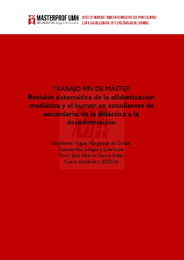Por favor, use este identificador para citar o enlazar este ítem:
https://hdl.handle.net/11000/34110Registro completo de metadatos
| Campo DC | Valor | Lengua/Idioma |
|---|---|---|
| dc.contributor.advisor | García-Aviles, Jose Alberto | - |
| dc.contributor.author | Margineda de Godos, Miguel | - |
| dc.contributor.other | Departamentos de la UMH::Psicología de la Salud | es_ES |
| dc.date.accessioned | 2024-12-10T11:25:22Z | - |
| dc.date.available | 2024-12-10T11:25:22Z | - |
| dc.date.created | 2024-09 | - |
| dc.identifier.uri | https://hdl.handle.net/11000/34110 | - |
| dc.description | Especialidad: Lengua y Literatura | es_ES |
| dc.description.abstract | La sociedad está habituada al uso del humor en todas las situaciones. Actualmente en las redes sociales los contenidos humorísticos son los más consumidos y producidos por los jóvenes de habla hispana. Partiendo del ámbito de la alfabetización mediática, este trabajo propone una revisión sistemática de la literatura científica existente sobre el humor y los estudiantes de enseñanza secundaria. Se revisaron un total de 62 artículos publicados en los últimos 15 años. Los resultados obtenidos indican que la alfabetización mediática comienza a ser una competencia ampliamente practicada en las clases. También muestran los peligros producidos por la confusión entre contenidos humorísticos y los informativos, que puede generar desinformación. A pesar de la conciencia existente acerca de estos riesgos, no existen propuestas didácticas específicas que doten al alumnado de herramientas para discernir géneros en las redes sociales. | es_ES |
| dc.description.abstract | Society is used to the use of humor in any type of situations. Currently on social media, humorous contents are the most consumed and produced by Spanish-speaking youth. Starting from the field of media literacy, this research proposes a systematic review of the existing scientific literature on humor and secondary school students. A total of 62 articles published in the last 15 years were reviewed. The results obtained indicate that media literacy is beginning to be a widely practiced skill in classes. They also show the dangers produced by the confusion between humorous and informative content, which can generate misinformation. Despite the existing awareness of these risks, there are no specific didactic proposals that provide students with tools to discern genres on social networks. | es_ES |
| dc.format | application/pdf | es_ES |
| dc.format.extent | 29 | es_ES |
| dc.language.iso | spa | es_ES |
| dc.publisher | Universidad Miguel Hernández de Elche | es_ES |
| dc.rights | info:eu-repo/semantics/openAccess | es_ES |
| dc.rights | Attribution-NonCommercial-NoDerivatives 4.0 Internacional | * |
| dc.rights.uri | http://creativecommons.org/licenses/by-nc-nd/4.0/ | * |
| dc.subject | Alfabetización mediática | es_ES |
| dc.subject | Educación secundaria | es_ES |
| dc.subject | Desinformación | es_ES |
| dc.title | Revisión sistemática de la alfabetización mediática y el humor en estudiantes de secundaria: de la didáctica a la desinformación | es_ES |
| dc.type | info:eu-repo/semantics/masterThesis | es_ES |

Ver/Abrir:
TFM MARGINEDA DE GODOS, MIGUEL.pdf
3,24 MB
Adobe PDF
Compartir:
 La licencia se describe como: Atribución-NonComercial-NoDerivada 4.0 Internacional.
La licencia se describe como: Atribución-NonComercial-NoDerivada 4.0 Internacional.
.png)